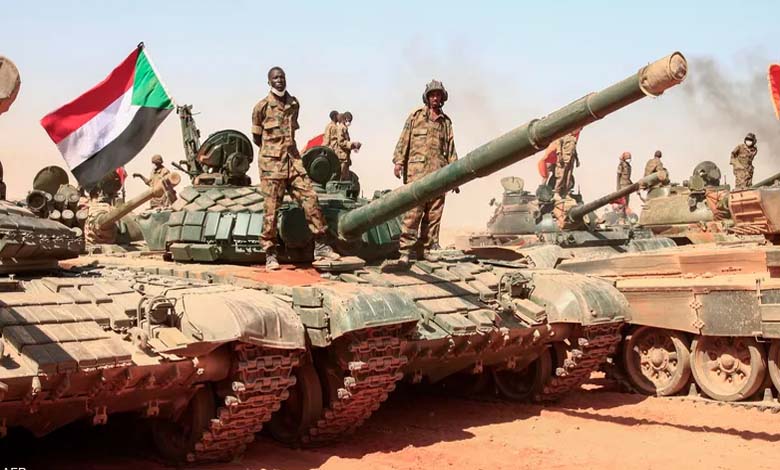Iranian Cooperation with the Sudanese Army: A Concealed Role in Escalating Military Conflict?

Iran has returned to the Sudanese scene by resuming operations at the Shendi and Metemma water stations after more than a decade of inactivity. While this project appears to be developmental, aimed at improving Sudan’s infrastructure, reports and analyses suggest that it may be a cover for arms transfers to the Sudanese army. This, in turn, is evidence of increasing military cooperation between Iran and the Sudanese army in its fight against the Rapid Support Forces. This partnership further complicates the Sudanese crisis and exacerbates the suffering of the people, while also shedding light on Iran’s ambitions to pursue its strategic interests in the region by using Sudan as a tool for regional influence.
-
Leaks: Arrival of an Iranian Delegation to Train the Sudanese Army and General Intelligence on Drone Use and Jamming Devices
-
Iranian-Sudanese Cooperation: Development Projects or a Disguise to Fuel Conflict and Strengthen Regional Influence?
The relationship between Iran and the Sudanese Army:
Iran has long sought to build strategic ties with Sudan, particularly with the Sudanese army. These relations have spanned many years, during which Iran has provided Sudan with military equipment and training, taking advantage of Sudan’s strategic location and political instability to bolster its influence in the Red Sea region. For Iran, Sudan represents an important gateway to reach deeper into Africa and the Arab world. In return, Sudan has benefited from Iranian support in facing its security and political challenges.
-
Bazeshkian explores, in his first meeting with al-Burhan, the expansion of Iranian influence in Sudan
-
A Resounding Fall for the Army and the Islamic Movement… Reactions to the Attorney General’s Request for Interpol to Arrest Political Leaders
Iranian intervention in the Sudanese war:
As the conflict between the Sudanese army and the Rapid Support Forces intensified, Iran stepped in to support the Sudanese army against this rival force. This intervention reflects Iran’s efforts to expand its influence in a volatile region, exploiting internal divisions to back one side against the other. Supplying arms to the Sudanese army is one clear manifestation of this support, and several reports have indicated that Iran is using developmental projects, such as restarting the Shendi and Metemma stations, to conceal the transfer of weapons and military equipment.
-
Iran Resumes Work at Shendi and Metemma Stations: A Cover for Arms Transfer or a Development Project?
-
Demands for the Dissolution of the Sudanese Army and Pursuit of the Muslim Brotherhood
Arms supply through the water project:
Numerous sources confirm that the resumption of work at the Shendi and Metemma water stations is part of Iran’s plan to supply weapons to the Sudanese army. These developmental projects serve as an ideal cover to hide arms smuggling operations. According to political analyst Ahmed Ismail, Iran is using development infrastructure as a means to transport military equipment while disguising its true intentions. This form of cooperation strengthens the Sudanese army in its war against the Rapid Support Forces, deepening the internal conflict and worsening the suffering of the Sudanese people.
-
After a 10-year halt… Iran resumes one of its projects in Sudan
-
Sudanese Analyst Reveals: Pressure Must Be Applied to Ensure the Flow of Humanitarian Aid
Public deception through influencers:
One of the most prominent methods Iran has used to promote its projects in Sudan is leveraging local and regional influencers to present the water project as a purely developmental effort. Among these influencers are journalist Mahmoud Abdullah and economist Youssef Al-Haj, who have portrayed the project as a positive step toward improving the lives of Sudanese citizens. However, many observers believe these media efforts are a smokescreen to conceal Iran’s real goal of supporting the Sudanese army against the Rapid Support Forces. Political researcher Hassan Ali affirmed that “these developmental projects are not as innocent as they appear; they carry hidden military and strategic interests.”
-
Escalation of the Conflict in Sudan: The Role of Foreign Arms Transfers and Their Threat to Civilians
-
After 500 Days of War… A Major Health and Food Crisis Facing Sudan
Iran and Sudan: A tool for gaining regional influence:
Iran views Sudan as a strategic partner through which it can increase its influence in the Arab region. Given Sudan’s sensitive geographic location, especially along the Red Sea, Iran can use this influence to control vital waterways, providing it with leverage over global trade. Iran is exploiting its involvement in the Sudanese conflict to boost its presence in the region and increase its impact on regional and international policies. As analyst Mohamed Al-Amin points out, “Iran aims to turn Sudan into a base in the region, enabling it to influence its Arab neighbors and threaten regional stability.”
Iran’s resumption of work at the Shendi and Metemma stations is not limited to the developmental aspect being promoted. It reveals broader strategic ambitions related to arms supply and support for the Sudanese army in its war against the Rapid Support Forces. This intervention reflects Iran’s desire to expand its influence over Sudan and use it as a tool to achieve its interests in the Arab region. In this context, the Sudanese people remain the most affected, as the conflict escalates and their suffering worsens.












